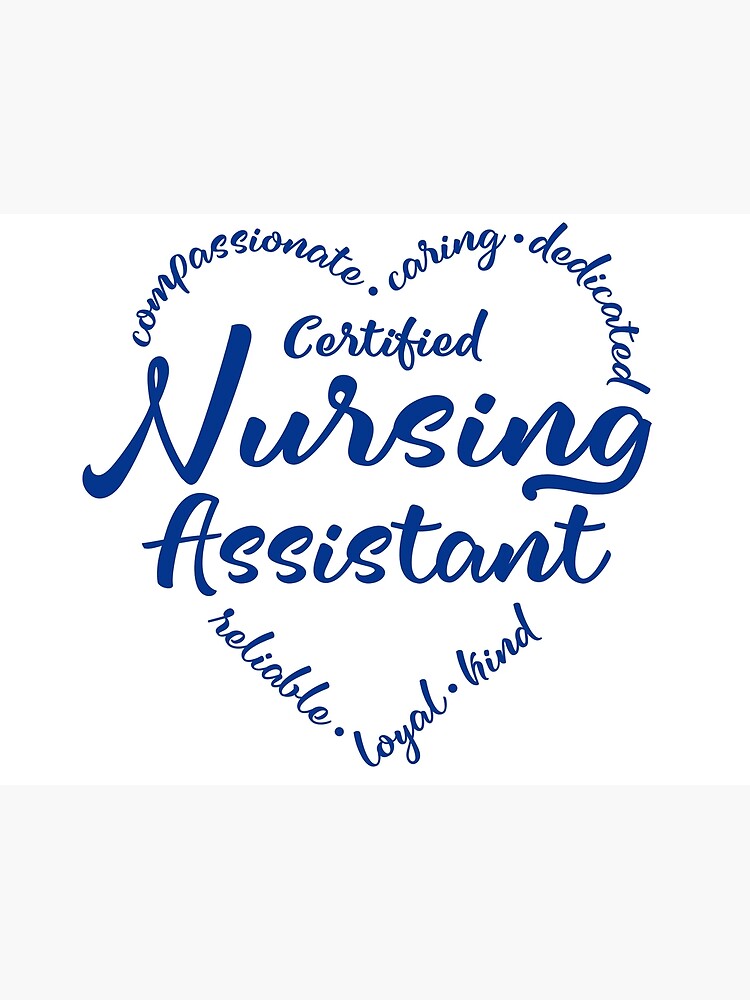Discover the ins and outs of becoming a Certified Nurse Assistant (CNA). Learn about the educational requirements, certification process, job outlook, and more in this comprehensive guide.
Becoming a Certified Nurse Assistant (CNA) is a rewarding career choice that plays a vital role in the healthcare system. CNAs provide essential support to registered nurses and licensed practical nurses, ensuring that patients receive high-quality care. In this comprehensive guide, we will cover everything you need to know about pursuing a career as a CNA, from the role’s responsibilities to educational requirements, certification process, and career prospects.
Who is a Certified Nurse Assistant (CNA)?

A Certified Nurse Assistant (CNA) is a healthcare professional who assists registered nurses and licensed practical nurses in providing basic care to patients. CNAs work in various healthcare settings, such as hospitals, nursing homes, and home healthcare agencies. Their primary responsibilities include helping with daily activities like bathing, dressing, and feeding, as well as monitoring vital signs and reporting any changes in a patient’s condition.
Becoming a CNA requires completing a state-approved training program and passing a competency evaluation. CNAs play a crucial role in ensuring the comfort and well-being of patients, making them an indispensable part of the healthcare team.
How Long Does It Take to Become a Certified Nurse Assistant (CNA)?
The path to becoming a Certified Nurse Assistant typically involves completing a state-approved training program, which can vary in length depending on the program and state regulations. On average, these programs can be completed in 4 to 12 weeks. They consist of both classroom instruction and hands-on clinical training, covering topics like infection control, patient safety, and basic nursing skills.
After completing the training program, aspiring CNAs must pass a competency evaluation, which includes a written exam and a skills demonstration. Once this step is successfully completed, individuals are eligible to apply for state certification, allowing them to work as CNAs.
What Does a Certified Nurse Assistant (CNA) Do?
Certified Nurse Assistants play a crucial role in providing basic care and support to patients under the supervision of registered nurses or licensed practical nurses. Their duties include assisting with activities of daily living (ADLs) such as bathing, dressing, and toileting, as well as turning and repositioning patients to prevent pressure ulcers. They also take vital signs, record patient information, and assist with mobility and exercises as prescribed by healthcare providers.
Furthermore, CNAs offer emotional support to patients and help create a comfortable and safe environment. They communicate patient needs and concerns to the nursing team, ensuring that any changes in a patient’s condition are promptly addressed.
How to Become a Certified Nurse Assistant (CNA):

Becoming a Certified Nurse Assistant involves several steps:
a. Research State Requirements: Begin by researching the specific requirements for CNAs in your state. Each state may have slightly different criteria for training and certification.
b. Enroll in a State-Approved Program: Choose a state-approved CNA training program. These programs are available at community colleges, vocational schools, and healthcare facilities. The curriculum typically includes both classroom instruction and hands-on clinical training.
c. Complete the Training Program: Successfully complete the required training, which typically takes 4 to 12 weeks. This will equip you with the knowledge and skills needed to excel in the role of a CNA.
d. Pass the Competency Evaluation: After completing the training, you’ll need to pass a competency evaluation, which consists of a written exam and a skills assessment. This evaluation ensures that you have acquired the necessary skills and knowledge to provide quality care to patients.
e. Apply for State Certification: Once you pass the competency evaluation, you can apply for state certification as a CNA. This certification is essential for working legally in the field.
Educational Requirements for CNAs:
To become a Certified Nurse Assistant, individuals must complete a state-approved training program. These programs cover essential topics such as infection control, patient safety, communication skills, and basic nursing procedures. The curriculum includes both classroom instruction and hands-on clinical training, providing aspiring CNAs with the knowledge and skills needed to excel in their role.
Additionally, CNAs must have a high school diploma or equivalent to be eligible for training programs. Some programs may also require applicants to pass a basic English and math assessment.
CNA Certification and Exam Requirements:
To become certified as a Nurse Assistant, candidates must pass a two-part competency evaluation. This evaluation includes a written exam, which assesses theoretical knowledge, and a skills demonstration, where candidates showcase their practical abilities in a clinical setting. Both components are designed to ensure that CNAs possess the necessary skills and knowledge to provide safe and effective care to patients.
Candidates must pass both parts of the competency evaluation to obtain certification. Once certified, CNAs are eligible to work in healthcare settings under the supervision of registered nurses or licensed practical nurses.
Where do Certified Nurse Assistants (CNAs) Work?
Certified Nurse Assistants can find employment in various healthcare settings, including:
a. Hospitals: CNAs work alongside registered nurses and other healthcare professionals to provide direct care to patients. They assist with ADLs, monitor vital signs, and ensure the comfort of patients.
b. Nursing Homes and Long-Term Care Facilities: CNAs play a crucial role in caring for residents in nursing homes, providing assistance with daily activities and ensuring their well-being.
c. Home Healthcare Agencies: Some CNAs work in a home healthcare setting, providing care to individuals in their own homes. They assist with ADLs, medication reminders, and other necessary tasks.
d. Rehabilitation Centers: CNAs in rehabilitation centers help patients recover from injuries or surgeries by providing hands-on care and support during the recovery process.
What is the Certified Nurse Assistant (CNA) Career Outlook and Career Growth:

The demand for Certified Nurse Assistants is expected to remain strong in the coming years due to an aging population and increased healthcare needs. According to the Bureau of Labor Statistics, employment of CNAs is projected to grow by 9% from 2020 to 2030, which is faster than the average for all occupations.
Moreover, CNAs have opportunities for career advancement. With additional training and experience, they can pursue roles such as Licensed Practical Nurse (LPN) or Registered Nurse (RN). Some CNAs also choose to specialize in areas like geriatrics or pediatric care, further enhancing their career prospects.
What are the Qualities of a Certified Nurse Assistant (CNA):

To excel as a Certified Nurse Assistant, individuals should possess certain qualities:
a. Compassion: CNAs must genuinely care about the well-being of their patients and show empathy in their interactions.
b. Communication Skills: Effective communication is crucial for understanding and meeting the needs of patients, as well as collaborating with the healthcare team.
c. Physical Stamina: The role of a CNA can be physically demanding, requiring the ability to lift and move patients, as well as stand for extended periods.
d. Attention to Detail: CNAs must pay close attention to patient needs and be vigilant in observing changes in their condition.
e. Adaptability: Healthcare settings can be fast-paced and dynamic, so CNAs should be able to adapt to different situations and prioritize tasks accordingly.
What is the Top Certified Nurse Assistant (CNA) Programs:
The top Certified Nurse Assistant programs can vary by location and individual preferences. It’s recommended to research accredited programs offered by reputable institutions such as community colleges, vocational schools, and healthcare facilities. Additionally, consider factors like program length, curriculum, clinical training opportunities, and student reviews when choosing a CNA program.
Are There Any Online Programs to Become a Certified Nurse Assistant (CNA)?
Yes, there are online programs available for aspiring CNAs. These programs typically offer theoretical instruction through online modules, but hands-on clinical training is still required and may be arranged at approved healthcare facilities. It’s crucial to ensure that any online program you choose is accredited and meets the state requirements for CNA certification.
What is the Salary of a Certified Nurse Assistant (CNA):
As of my last knowledge update in January 2022, the median annual salary for Certified Nurse Assistants in the United States was approximately $30,850. However, salaries can vary based on factors such as location, years of experience, and the specific healthcare setting. It’s important to note that salary figures may have changed since then, so it’s recommended to consult the latest data from reliable sources.
How is a Certified Nursing Assistant (CNA) Different From a Medical Assistant (MA)?
Certified Nurse Assistants (CNAs) and Medical Assistants (MAs) have distinct roles in the healthcare field. While both play vital support roles, their responsibilities and scope of practice differ:
- CNAs: Focus primarily on providing basic care to patients, including activities of daily living (ADLs) like bathing, dressing, and feeding. They also monitor vital signs and report changes in a patient’s condition to the healthcare team.
- MAs: Have a broader scope of practice that may include both administrative and clinical tasks. They may assist with administrative duties like scheduling appointments and managing patient records, as well as clinical tasks like taking patient histories and preparing patients for exams.
How Do CNAs Transition to Other Nursing Positions:
Certified Nurse Assistants (CNAs) who wish to advance their careers in nursing have several pathways available:
a. Licensed Practical Nurse (LPN) or Licensed Vocational Nurse (LVN): CNAs can further their education and training to become LPNs or LVNs. This typically involves completing a practical nursing program and passing the licensing exam.
b. Registered Nurse (RN): With additional education, CNAs can pursue a nursing degree (Associate’s or Bachelor’s) to become registered nurses. This opens up opportunities for more advanced practice and specialized areas of nursing.
c. Specialty Certification: CNAs who gain experience in specific areas of healthcare, such as geriatrics or pediatrics, can pursue additional certifications to specialize in those fields.
d. Nursing School Bridge Programs: Some nursing schools offer bridge programs designed for CNAs who want to transition into an LPN or RN role. These programs recognize the foundational knowledge and skills that CNAs possess.
Conclusion:
Becoming a Certified Nurse Assistant (CNA) is a fulfilling career choice with a positive job outlook and opportunities for advancement. CNAs play a vital role in providing essential care to patients in various healthcare settings. The path to becoming a CNA involves completing a state-approved training program, passing a competency evaluation, and obtaining state certification.
With qualities like compassion, effective communication, and attention to detail, CNAs contribute significantly to the well-being of patients. As the healthcare industry continues to evolve, the demand for CNAs is expected to remain strong, offering a stable and rewarding career path. For those considering a career in healthcare, becoming a CNA can be a meaningful first step towards making a difference in the lives of patients and their families.
Frequently Asked Questions
- How long does a CNA course take?
- A Certified Nurse Assistant (CNA) course typically takes between 4 to 12 weeks to complete. The duration can vary based on the specific program and state regulations. These courses include both classroom instruction and hands-on clinical training to prepare individuals for the responsibilities of a CNA.
- Where can I study CNA?
- You can study to become a Certified Nurse Assistant at various accredited institutions, including community colleges, vocational schools, nursing homes, and healthcare facilities. It’s important to ensure that the program you choose is state-approved and meets the necessary requirements for CNA certification.
- What’s the fastest you can become a CNA?
- The fastest you can become a Certified Nurse Assistant is typically around 4 weeks, depending on the specific program and state regulations. Some accelerated programs may offer an intensive curriculum that allows students to complete their training in a shorter timeframe.
- Is CNA Marketable?
- Yes, being a Certified Nurse Assistant (CNA) is highly marketable in the healthcare industry. With an aging population and increasing demand for healthcare services, there is a consistent need for qualified CNAs to provide essential care to patients. The skills and training acquired as a CNA also serve as a valuable foundation for those considering further advancement in the healthcare field.
- Do I Have to Sit for the CNA Exam Again if My Certification is Expired?
- If your CNA certification has expired, you may be required to retake the CNA exam and meet the current certification requirements in your state. It’s important to check with your state’s nursing board or regulatory agency for specific guidelines on re-certification after an expiration.
- Can I Work as a Certified Nurse Assistant (CNA) as a Nursing Student?
- Yes, as a nursing student, you can work as a Certified Nurse Assistant (CNA) provided you have completed the required training and obtained state certification. Working as a CNA can be a valuable experience for nursing students, as it provides hands-on exposure to patient care and helps reinforce classroom learning. It also offers insight into the healthcare environment and enhances your skills as you pursue your nursing education.
A Page will cost you $12, however, this varies with your deadline.
We have a team of expert nursing writers ready to help with your nursing assignments. They will save you time, and improve your grades.
Whatever your goals are, expect plagiarism-free works, on-time delivery, and 24/7 support from us.
Here is your 15% off to get started.
Simply:
- Place your order (Place Order)
- Click on Enter Promo Code after adding your instructions
- Insert your code – Get20
All the Best,
Cathy, CS


